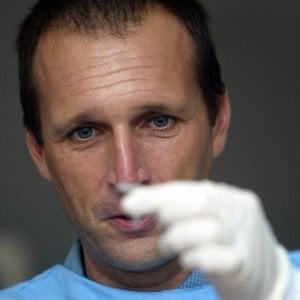I graduated in biology from the University of York in 1984. The same year I joined the MRC Clinical Immunology Research Unit, Royal Postgraduate Medical School, Hammersmith Hospital (now Imperial College School of Medicine) where we researched auto-immune nephritis. From 1985-7 I studied for an M.Sc. in Immunology at Kings, Queen Mary and Chelsea colleges. I joined David Mabey at LSHTM in 1987 and studied for a Ph.D in cellular immunity following ocular infection with Chlamydia trachomatis. This was followed by two post-doctoral positions in Edinburgh firstly at the Moredun Research Institute in retrovirology and then the Edinburgh University Institute of Cell, Animal and Population Biology (now Institute for Infection and Immunology Research) to study intestinal nematode infestations with Rick Maizels. In June 2000 I rejoined the trachoma group at LSHTM to continue studies on the immunology and pathogenesis of trachoma. From 2002 until 2010 I was based at the MRC Unit in The Gambia and from 2005-2010 led trachoma research based at the MRC laboratories. I am currently based at the Keppel Street site with continuing projects in Tanzania, Guinea Bissau and The Gambia.
Affiliations
Centres
Teaching
I am currently module leader for DL Immunology of infection and vaccines (IDM213) and F2F Vaccine Immunology (3191). I also contribute tutoring and lectures in Immunology and Advanced Immunology and the Neglected Tropical Diseases (3465) module. Previously I have taught Immunology at undergraduate level whilst at the University of Edinburgh. I have supervised a number of B.Sc and M.Sc students from several universities in the U.K and U.S and advised and co-supervised doctoral research students whilst at MRC Unit The Gambia and at LSHTM. Between 2012-2021 I was research degrees coordinator for the Clinical Research Department. For 2023-24 I am supervising 4 doctoral research students.
Research
My longer term interest is the study of immune responses to C. trachomatis and C. trachomatis vaccine candidates. I was part of a EU Horizon 2020 funded consortium to develop a vaccine against C. trachomatis ocular infections (TracVac) and a member of the London Centre for Neglected Tropical Disease Research.
In particular I have applied genomic scale studies to trachoma examining the conjunctival transcriptome by microarray, RNAseq and high through put quantitative RTPCR. I have also driven studies on ocular bacterial communties using 16S-amplicon sequencing, the global anti-Ct antibody repertoire, host genetic susceptiblity by GWAS and pathogen variation by whole genome sequencing. This has led to the development of a number of research areas including investigating the role of NK cells in the response to C. trachomatis, the contribution of host genetics (in particular the role of KIR/HLA) to disease and understanding the extent of pathogen diversity and its impact on clinical disease. More recently in disease control programmes I have studied the impact of Azithromycin treatment and MDA on the host microbiome, resistome and gut function. For infectious disease immunology I remain interested in the application of NGS to HLA-sequence typing in the context of vaccine response (HPV/LAIV) and the B-cell receptor repertoire (HPV). I have a wider interest in other NTDs and interventions for disease control such as the impact of Schistosomiasis on gut function and treatment with PZQ and the impact of Azithromycin treatment on the breast milk microbiota.
